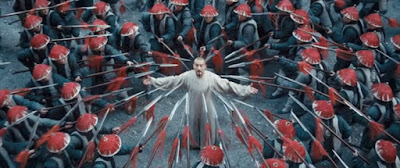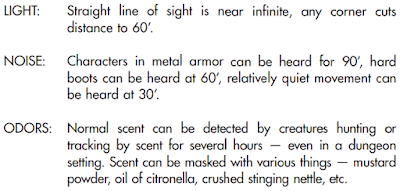5 Old School Ways for Making D&D More Lethal
It's a classic scenario. Six 1st level guardsmen have an 8th level fighter cornered in an alleyway, their crossbows cocked and loaded and trained on him. What happens next?
What we might expect from D&D on the surface is that the 6 guardsmen will fire their crossbows. Most will miss. One, maybe two will hit, depleting 5-10% of the level 8 fighter's hit points, 15% at the very most. The fighter retaliates, most likely hitting one of the guardsmen with a lethal blow. After about 6 rounds, we estimate the fighter will have slain all the guardsmen while himself having only suffered 25-30% of his hit points.
This squares well with some fantasy fiction. But not with others. Sometimes we want the guardsmen to present a credible enough threat such that often times the best things for the 8th level fighter to do is surrender. If there were a way of making actions other than fighting more viable and sometimes even the optimal choice, we broaden the array of possible stories that emerge from play.
Forget critical hits. Here are some old-school ways of making D&D more lethal.
#1 Lower Level Play
One of the great things about D&D is that the feel and genre of the game can vary with the level of play. At 1st level, D&D is incredibly lethal. On the other hand, Deities & Demi-Gods stats divine beings as characters of level 14+. Between the extremes, you should be able to find a range of levels that fit the feel of your particular campaign. A single 6th level fighter will have a substantially harder time fighting six 1st level fighters than an 8th level fighter would.
#2 Save Or Die
No matter how high level you are, no matter how many hit points you have, save or die poisons mean you're only ever one lucky hit from dead. Granted, higher level characters are more likely to save successfully, but even a 5% or 10% chance of losing a character is a bitter pill to swallow, and certainly not something to be taken lightly, especially where parlay is possible. If you want to be gentle about it, the guardsmen may be using bolts laced with a sleep poison.
#3 Level Drain
Much like Save or Die, higher level characters are more likely to avoid a level drain. However, for higher level characters, the experience point cost of losing a level is many times more severe than a lower level character. Not that ordinary guardsmen would have this ability. But, then again, many of the creatures who do can also take on ordinary human form, so you can never quite be sure.
#4 Assassination Table
This provides a probability for dealing instant death. Moreover, it is not only limited to members of the Assassin class. A lesser known rule calls for a special combat modifier that the Assassin table be consulted when attacking "helpless" targets. The precise definition of helpless is a matter for adjudication by the DM. This means if such is befitting the flavor of the campaign the DM may rule that the lone fighter cornered in an alleyway by the six guardsmen with their crossbows at the ready is in a "helpless" position.
Now reconsider how the above plays out with the "helpless" rule. The odds of a 1st level character instantly slaying an 8th level one is listed as 10% on the Assassins' Table. With each of the guardsmen having a 10% chance of instantly slaying the fighter on the first go, this evens up the odds quite a bit. It is about 47% likely that at least one of the guardsmen will score a lethal hit. Of course, if the fighter survives that initial volley, the odds swing decidedly in his favor. What drama!
#5 All of the Above
Bringing it all together creates a synergy. Level drainers help keep the PC group in a lower level range, preventing them from becoming overly powerful in the first place. Between Save or Die attacks and one-hit-kill attacks, there is ample enough opportunity to include them smoothly in the game frequently enough that it is perceived as an ever-present risk even when they are absent.
Making liberal use of not just the "helpless" modifier but of all combat modifiers tilts the balance in favor of player decision-making becoming more substantial relative to stats in general. And so players must always be mindful of their choices--high level alone does not grant immunity to poorly thought out courses of action.
What we might expect from D&D on the surface is that the 6 guardsmen will fire their crossbows. Most will miss. One, maybe two will hit, depleting 5-10% of the level 8 fighter's hit points, 15% at the very most. The fighter retaliates, most likely hitting one of the guardsmen with a lethal blow. After about 6 rounds, we estimate the fighter will have slain all the guardsmen while himself having only suffered 25-30% of his hit points.
This squares well with some fantasy fiction. But not with others. Sometimes we want the guardsmen to present a credible enough threat such that often times the best things for the 8th level fighter to do is surrender. If there were a way of making actions other than fighting more viable and sometimes even the optimal choice, we broaden the array of possible stories that emerge from play.
Forget critical hits. Here are some old-school ways of making D&D more lethal.
#1 Lower Level Play
One of the great things about D&D is that the feel and genre of the game can vary with the level of play. At 1st level, D&D is incredibly lethal. On the other hand, Deities & Demi-Gods stats divine beings as characters of level 14+. Between the extremes, you should be able to find a range of levels that fit the feel of your particular campaign. A single 6th level fighter will have a substantially harder time fighting six 1st level fighters than an 8th level fighter would.
#2 Save Or Die
No matter how high level you are, no matter how many hit points you have, save or die poisons mean you're only ever one lucky hit from dead. Granted, higher level characters are more likely to save successfully, but even a 5% or 10% chance of losing a character is a bitter pill to swallow, and certainly not something to be taken lightly, especially where parlay is possible. If you want to be gentle about it, the guardsmen may be using bolts laced with a sleep poison.
#3 Level Drain
Much like Save or Die, higher level characters are more likely to avoid a level drain. However, for higher level characters, the experience point cost of losing a level is many times more severe than a lower level character. Not that ordinary guardsmen would have this ability. But, then again, many of the creatures who do can also take on ordinary human form, so you can never quite be sure.
#4 Assassination Table
This provides a probability for dealing instant death. Moreover, it is not only limited to members of the Assassin class. A lesser known rule calls for a special combat modifier that the Assassin table be consulted when attacking "helpless" targets. The precise definition of helpless is a matter for adjudication by the DM. This means if such is befitting the flavor of the campaign the DM may rule that the lone fighter cornered in an alleyway by the six guardsmen with their crossbows at the ready is in a "helpless" position.
Now reconsider how the above plays out with the "helpless" rule. The odds of a 1st level character instantly slaying an 8th level one is listed as 10% on the Assassins' Table. With each of the guardsmen having a 10% chance of instantly slaying the fighter on the first go, this evens up the odds quite a bit. It is about 47% likely that at least one of the guardsmen will score a lethal hit. Of course, if the fighter survives that initial volley, the odds swing decidedly in his favor. What drama!
#5 All of the Above
Bringing it all together creates a synergy. Level drainers help keep the PC group in a lower level range, preventing them from becoming overly powerful in the first place. Between Save or Die attacks and one-hit-kill attacks, there is ample enough opportunity to include them smoothly in the game frequently enough that it is perceived as an ever-present risk even when they are absent.
Making liberal use of not just the "helpless" modifier but of all combat modifiers tilts the balance in favor of player decision-making becoming more substantial relative to stats in general. And so players must always be mindful of their choices--high level alone does not grant immunity to poorly thought out courses of action.




If the guardsmen don't fear death, all of them can rush him and overbear him. One might die, but the battle would likely be over.
ReplyDeleteWhere there's a will, there's always a way.
DeleteI wrote this specifically in response to an idea that's been around where some people feel the hero should just give up when the crossbows are aimed at him because they either find that "realistic", dramatically appropriate, or they feel that D&D's hit point system gives some bad incentives that make high level PCs feel invulnerable and turn every conflict into a fight.
There are obviously a wealth of options "on the books" to address this concern for DMs who prefer this style or feel.